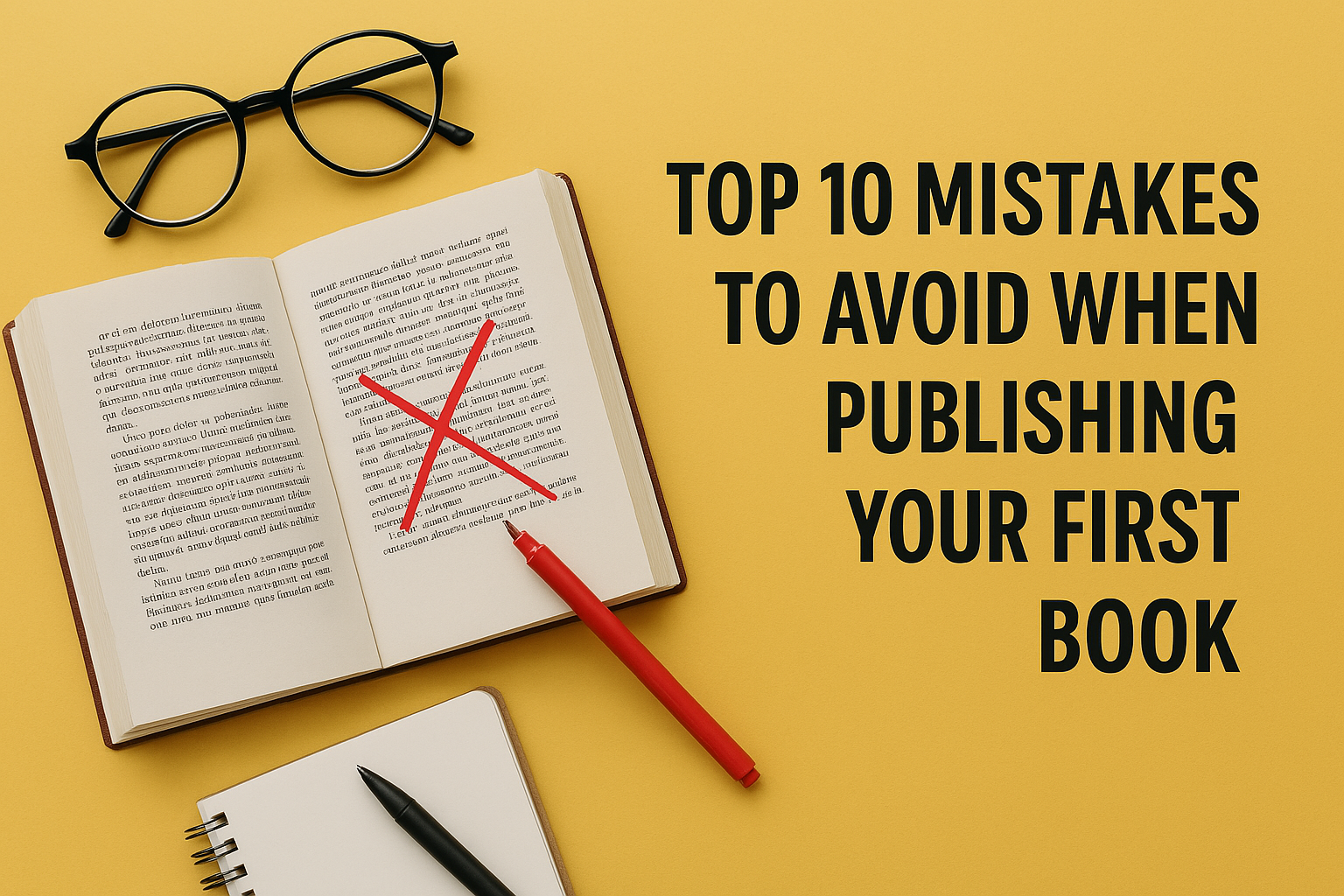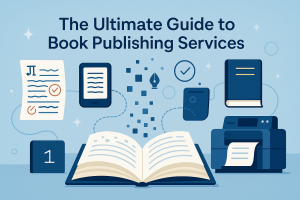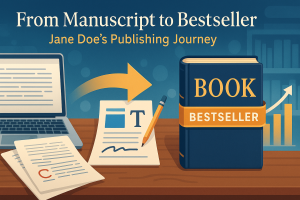Publishing your first book is an exciting and life-changing experience, but the journey can be riddled with pitfalls that may derail your success if not handled carefully. In this comprehensive guide, we dive into the top 10 mistakes you need to avoid when publishing your first book, offering actionable advice and practical tips. We also share insights on critical decisions such as choosing the right publishing route, refining your writing style, and understanding the intricacies of the publishing industry. Whether you’re planning a traditional release or opting for self-publishing, learning from others’ mistakes can save you both time and money.
This article covers:
- Essential planning and target audience definition
- Choosing the right publishing path and service
- Polishing your manuscript through quality editing and design
- Navigating marketing, technological trends, and practical strategies
- How to overcome common hurdles and find success in the competitive world of book publishing
Let’s explore each common mistake, learn from real-world examples, and set the stage for a successful publication.
1. Poor Planning and Lack of Clear Vision
One of the most common mistakes made by first-time authors is failing to plan thoroughly. When you dive headfirst into writing without a comprehensive outline, it can lead to disorganized ideas, inconsistent themes, and a manuscript that ultimately struggles to connect with your target audience.
Tips to avoid this mistake:
- Define Your Book’s Purpose:
Understand why you’re writing your book. Are you aiming to entertain, educate, or inspire your readers? Clearly articulate your purpose to maintain focus through each chapter. - Create a Detailed Outline:
Organize your thoughts with a detailed outline. Break your book into sections, chapters, and even sub-chapters. This structure not only makes writing smoother but also ensures that your narrative remains coherent. - Set Realistic Deadlines:
Planning includes time management. Create a timeline with milestones for drafting, revising, and finalizing your manuscript.
By investing time in planning, you lay a solid foundation for a well-structured book that resonates with your readers.
2. Not Defining Your Target Audience
Understanding who your book is for is crucial. Many first-time authors make the mistake of writing without considering the needs and expectations of their readers. A book written solely from your perspective might not connect with your intended audience.
How to better define your target audience:
- Research Your Genre:
Analyze bestsellers and trends in your genre. Identify common themes, language styles, and content that appeal to that readership. - Create Reader Personas:
Develop detailed reader profiles that describe your ideal audience—their interests, reading habits, and even challenges. This step can shape how you present your message. - Solicit Feedback Early:
Engage with potential readers or use writing groups to receive early feedback on your draft. This iterative input can guide adjustments that better align your book with audience expectations.
3. Choosing the Wrong Publishing Route
One critical decision in your publishing journey is choosing between traditional publishing and self-publishing. Each route has its benefits and challenges. Rushing into a decision without proper research can lead to regret later on.
Key considerations:
- Traditional Publishing:
Traditionally published books often benefit from professional editing, design, and marketing. However, the process is highly competitive and time-consuming. - Self-Publishing:
Self-publishing offers creative control and a quicker route to market. But it demands that you manage everything—from editing and cover design to distribution and marketing.
For an in-depth comparison of both options and to determine the best fit for your project, check out this detailed article on self-publishing vs traditional publishing pros and cons. - Choosing the Right Publishing Service:
Regardless of your route, research potential partners thoroughly. Consider their reputation, support services, and distribution reach. If you’re leaning towards professional support, learn more about how to choose the right book publishing service.
Evaluating these factors helps you choose the path that aligns with your goals and resources.
4. Neglecting Professional Editing and Proofreading
Even the most brilliant story can be undermined by poor grammar, spelling errors, and inconsistent voice. Many first-time authors either underestimate the importance of professional editing or attempt to self-edit extensively, which often does not yield the desired quality.
Why professional editing matters:
- Objective Feedback:
A professional editor provides a fresh perspective on your manuscript. They can identify issues with pacing, structure, and clarity that you might have missed. - Improved Readability:
Well-edited content reads smoothly and engages the audience. It also builds your credibility as an author. - Avoiding Costly Mistakes:
Errors in your published book can hurt your reputation and lead to costly reprints or corrections.
For aspiring authors who want to understand the editing process better, consider exploring insights on how to become a book editor. Embracing professional editing can elevate your manuscript to industry standards.
5. Overlooking the Importance of Book Design and Formatting
A book’s design is often the first impression it makes on potential readers. Poor formatting, unattractive cover design, or an unprofessional layout can deter even the most interested audience from picking up your book.
Essential design elements to consider:
- Cover Design:
Your cover is your book’s billboard. Invest in a high-quality design that reflects your book’s genre and captures the essence of your story. - Interior Formatting:
Ensure consistent formatting for fonts, spacing, and margins. A reader-friendly layout improves the overall reading experience, whether your book is in print or digital form. - Visual Appeal:
Incorporate elements such as images, diagrams, or illustrations where relevant, but ensure these elements complement rather than overpower your narrative.
Attention to design details shows professionalism and respect for your audience, making your book more attractive in a competitive market.
6. Failing to Develop a Unique Writing Style
Many novice authors err by mimicking styles of popular writers or trying to force a trend rather than developing their unique voice. Authenticity is key in engaging readers and setting your work apart from the crowd.
Steps to refine your writing style:
- Experiment with Tone:
Experiment with varying levels of formality until you find a tone that suits both your personality and the subject matter. For example, understanding the nuances of informal and relatable writing can be enhanced by exploring what casual writing in a book truly means. - Be Authentic:
Readers are drawn to genuine storytelling. Focus on writing authentically instead of imitating trends that do not resonate with your personal style. - Practice and Revise:
As you write, allow your style to evolve. Revisit earlier drafts and notice the subtle shifts in your voice that can eventually define your signature style.
By embracing your true self in writing, you create a lasting connection with your readers.
7. Underestimating the Role of Marketing
The adage “if you build it, they will come” rarely applies in the world of book publishing. Even the best-written book requires robust marketing to reach its audience. Many first-time authors make the mistake of underestimating or neglecting the importance of a solid marketing plan.
Key areas for effective book marketing:
- Develop a Marketing Plan:
Start by outlining a strategy for social media, email campaigns, book signings, and virtual events. Identify the channels where your target audience is most active. - Utilize Online Tools:
Build a professional author website, maintain an active blog, and leverage social media platforms to build your brand and create buzz around your book. - Engage with Your Community:
Interact with readers, participate in author events, and consider online promotions such as giveaways or interviews. Insights on effective book marketing can be further explored in resources dedicated to how to market your own book.
A well-crafted marketing strategy not only drives sales but also builds a lasting reader base and enhances your overall author brand.
8. Ignoring the Impact of Emerging Technology
The publishing industry is evolving, and the integration of technology has transformed how books are written, edited, and distributed. First-time authors sometimes miss out on powerful technological tools that can significantly streamline the publishing process and enhance the quality of their work.
Embrace technology in your publishing journey:
- AI in Publishing:
Artificial intelligence is revolutionizing various aspects of the industry, from grammar checking to generating creative ideas. Discover how these innovations can benefit your work by reading about how AI is transforming publishing. - Digital Tools for Writers:
Use writing software, collaborative platforms, and digital feedback tools to refine your manuscript more efficiently. - Stay Updated:
The technology landscape is continuously evolving, and staying informed about new tools and trends can give you a competitive edge in the publishing world.
Leveraging modern technology not only simplifies many aspects of the publishing process but also increases your opportunities for creative expression and professional growth.
9. Failing to Embrace Alternative Writing Opportunities
Many aspiring authors limit themselves by not considering the broader spectrum of writing opportunities available in the industry. Whether you dream of penning a memoir or exploring ghostwriting, it’s important to keep an open mind.
Why diversifying your writing experience matters:
- Ghostwriting as a Learning Opportunity:
Some first-time authors may find that working as a ghostwriter can provide valuable insights into different writing styles and enhance their storytelling abilities. If you’re interested in exploring this side of writing, check out expert tips on how to become a ghostwriter. - Writing About Your Life:
Personal stories and memoirs have a unique appeal, offering an intimate glimpse into your experiences and emotions. For guidance on sharing your personal journey effectively, consider learning more about writing a book about your life.
Diversifying your writing portfolio can open new career avenues and enrich your craft, making you a more versatile author.
10. Overlooking the Value of Inspirational Stories
Inspiration fuels creativity, yet many first-time authors neglect to seek out stories that might motivate them or add depth to their work. Learning from the lives and struggles of others can provide the spark needed to overcome obstacles in your own writing journey.
Find inspiration in real stories:
- Real-World Examples:
Reading about the journeys of other authors can instill confidence and provide practical lessons. For instance, exploring narratives of courage and resilience can remind you that every challenge is surmountable. An inspiring example of this is showcased in Discover The Women: A Story of Courage, a testament to triumph over adversity. - Learning from Others:
Attend literary events, join writers’ groups, and read memoirs and biographies of successful authors. The more you expose yourself to varied experiences, the richer your own creative voice will become.
Embrace inspirational content as an integral part of your writing journey to overcome doubt and nurture your creativity.
Conclusion
Publishing your first book is a monumental achievement, yet navigating the process without falling into common traps requires preparation, awareness, and continuous learning. By avoiding these top 10 mistakes—from inadequate planning and unclear target audiences to neglecting professional editing and ignoring marketing strategies—you can set yourself up for lasting success in the competitive world of book publishing.
Remember that every author’s journey is unique. Embrace your mistakes as learning opportunities, refine your craft with every revision, and be open to embracing new technological and literary trends. Your first book is not only a product of your passion and creativity but also the result of strategic decisions that shape its reception and impact. With perseverance and informed decision-making, you’ll overcome obstacles and find your voice in the literary world.









